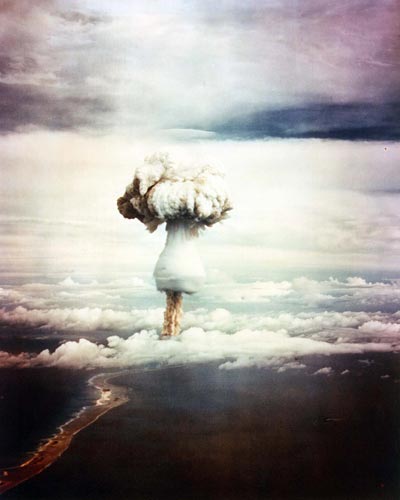Support justice-driven, accurate and transparent news — make a quick donation to Truthout today!
The Republic of the Marshall Islands (RMI), a Pacific Islands country of 70,000, took bold action on April 24, 2014, on nuclear disarmament. It brought lawsuits at the International Court of Justice (ICJ), the world’s highest court, against the nine nuclear-armed countries, accusing them of violating their obligations under international law to negotiate in good faith to end the nuclear arms race and for total nuclear disarmament.
Because of the importance of the United States as a nuclear power and the fact that it does not accept the compulsory jurisdiction of the ICJ, the Marshall Islands at the same time brought a similar lawsuit against the United States in US federal district court in Northern California.
The United States conducted 67 nuclear tests on their islands between 1946 and 1958, with the equivalent power of exploding 1.6 Hiroshima bombs daily for 12 years.
In the United States, rather than engaging in the case in good faith, the government responded by filing a motion to dismiss the case on jurisdictional grounds. On February 3, 2015, George W. Bush-appointee Judge Jeffrey White granted the US motion to dismiss the case on the grounds that the RMI, although a party to the Nuclear Non-Proliferation Treaty (NPT), lacked standing to bring the case and that the lawsuit is barred by the political question doctrine.
Regarding the RMI’s standing to bring the case, Judge White found that the harm of the future spread and use of nuclear weapons is too speculative “to establish injury in fact.” By implication, the court is taking the position that the RMI must wait until there is further nuclear proliferation or a nuclear war to establish a concrete injury suitable to provide standing.
Further, the court found that the RMI claims of injury “cannot be redressed by compelling the specific performance of only one nation to the Treaty,” that is, the United States. But this is not what the RMI was asking of the court. It was asking that the court declare the United States in breach of its obligations under the NPT and customary international law and to order the United States to commence negotiations in good faith within one year.
The court went on to say that even if the RMI could establish standing to sue, it would be barred by the political question doctrine, which says that political questions should be handled by the political branches of government rather than by the courts. In this case, the court deferred to the executive branch of government, the branch that the RMI accused of failing to fulfill its legal obligations. The court’s decision on this is akin to turning the matter over to the foxes to guard the nuclear henhouse. This will cause many national leaders to reconsider the value of entering into treaties with the United States.
In an important concluding footnote to the court’s decision, Judge White wrote, “… the Court finds enforcement shall depend upon the interest and honor of the parties to the Treaty.” The judge was drawing upon an 1884 case known as Hard Money Cases, and included this quote from that case, “If these [interests] fail, its infraction becomes the subject of international negotiations and reclamations. … It is obvious that with all this the judicial courts have nothing to do and can give no redress.” What the judge omitted in the ellipses following the word “reclamations” was “so far as the injured party chooses to seek redress, which may in the end be enforced by actual war.”
In other words, in dismissing the Marshall Islands case, the judge relied upon a 19th century case that left matters to the executive branch of government, with the fallback position not of a peaceful judicial remedy, but enforcement by war. Of course, so long as nuclear weapons exist, that war could be a nuclear war, with the possibility of destroying cities, countries, civilization and human life on the planet.
Knowing how high the stakes are for humanity, the Marshall Islands will not give up. Their people suffered the catastrophic and irreparable damage these weapons inflict when the United States conducted 67 nuclear tests on their islands between 1946 and 1958, with the equivalent power of exploding 1.6 Hiroshima bombs daily for 12 years. The RMI has vowed to fight so that no one else on Earth will ever have to suffer these atrocities. It intends to take the next step and appeal the court’s order to the Ninth Circuit Court of Appeals. It also remains engaged in the three lawsuits for which there is compulsory jurisdiction at the ICJ, those against India, Pakistan and the UK.
Despite the Court’s ruling on the motion to dismiss, there is nothing preventing the United States from fulfilling its obligations to enter into negotiations in good faith for complete nuclear disarmament. Surely, a US initiative for convening such negotiations would be welcomed by most of the world’s countries and people. It would reduce the chances of nuclear proliferation, nuclear accident and nuclear war. It would also be consistent with President Obama’s Prague promise regarding “America’s commitment to seek the peace and security of a world without nuclear weapons.”
Media that fights fascism
Truthout is funded almost entirely by readers — that’s why we can speak truth to power and cut against the mainstream narrative. But independent journalists at Truthout face mounting political repression under Trump.
We rely on your support to survive McCarthyist censorship. Please make a tax-deductible one-time or monthly donation.
